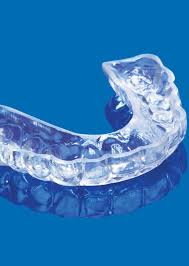A mouth guard is a prosthesis worn over the teeth to protect them from injury.
Mouth guards can be stock mouth guards, mouth-formed or custom-made.
The mouth-formed ones (also known as boil and bite) are self-adapting. They soften when placed in hot water, they are cooled and adapted to the user’s mouth using the user’s bite and manipulation with the hands and fingers. These mouth-formed ones can be used at home or by a dentist.
The custom-made ones are fabricated at the dental clinic and made specially for you using measurements of your mouth taken with an impression. These ones are the most recommended.

WHO NEEDS A MOUTH GUARD?
Mouth guards are useful in a number of situations:
- Teeth-grinding habit: They are useful to prevent damage if a person has a habit of grinding their teeth especially during sleep
- Sporting activities: They are very useful for boxers and athletics in order to prevent damage to teeth
- Acute temporomandibular joint disorders: The temporomandibular joint is the joint between the upper and lower jaws. Disorders in this joint may be as a result of teeth grinding or teeth wear.
- Tooth splints: Mouth guards may be used to splint mobile teeth, as part of periodontal treatment
- While receiving orthodontic treatments, mouth guards may be useful for a person whose upper teeth are too forward. When the upper teeth are too forward, they are prone to injury.
WHAT TO EXPECT (CUSTOM-MADE MOUTHGUARDS)
Your dentist will introduce himself to you and examine your mouth.
He will explain the need of a mouth guard to you and with your consent, he will go ahead to fabricate one for you.
He will take a measurement of your mouth using alginate material to make an impression of your mouth.
The impression will be sent to the laboratory where it will be used to make a model of your mouth. The model is an accurate replica of your mouth and the mouth guard will be fabricated on it.
These mouth guards are usually fabricated in acrylic.
POST-PROCEDURE INSTRUCTIONS
These mouth guards are usually fabricated in acrylic.
- Inform your dentist if any complaint you may have
- Book your next appointment before you leave the clinic
- Care for your mouth guard by cleaning it with clean cold water, mild soap and a soft toothbrush
- If your mouth guard is in acrylic, always store it in clean room-temperature water. If not, store in a strong clean container with vents to keep it dry.
- Don’t leave your mouth guards in the sun or hot water
- Practise good oral hygiene. Keep your mouth guard clean. Ask your dentist to teach you how

FAQ
Yes, you can. This may be particularly useful if you play sports.
Your dentist can help you find the most suitable option.
No, they don’t.
See your dentist regularly to assess your mouth guards for signs of wear and for replacements.

